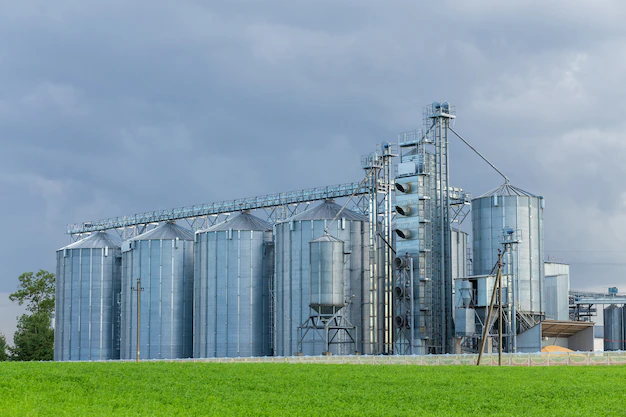Silos and grain storage systems play a crucial role in modern agriculture by providing efficient and effective storage solutions for harvested crops. Here are some key reasons why silos and grain storage systems are important:
- Preservation of Grain Quality: Silos and grain storage systems help preserve the quality of harvested grains. Proper storage conditions, such as controlled temperature, humidity, and protection from pests and rodents, ensure that the grains remain in optimal condition. This helps prevent spoilage, mold growth, and insect infestations, which can significantly reduce the value and marketability of the grain.
- Extended Shelf Life: By creating a suitable environment for grain storage, silos allow farmers to store their crops for extended periods without significant quality deterioration. This is particularly important in regions where crops are harvested in a short period but need to be distributed and consumed throughout the year.
- Market Timing and Price Optimization: Silos enable farmers to store their grains until market conditions are favorable for selling. This provides the opportunity to wait for better prices, avoid selling during periods of low demand or oversupply, and take advantage of seasonal fluctuations in grain prices. Farmers can effectively manage their marketing strategies and maximize their profits by having control over the timing of grain sales.
- Value-Added Processing: Silos can be equipped with equipment for cleaning, drying, and processing grains. This allows farmers to add value to their crops before selling them, such as removing impurities, reducing moisture content, or even turning grains into higher-value products like flour or feed. Value-added processing within the storage system can enhance profitability and diversify income streams for farmers.
- Risk Management: Silos and grain storage systems help farmers manage risks associated with unpredictable weather conditions, pests, and market volatility. When adverse weather conditions disrupt harvesting or transportation, having on-farm storage capacity ensures that the crops can be safely stored until conditions improve. It also provides a buffer against unexpected changes in market prices, allowing farmers to adapt their selling strategies accordingly.
- Increased Farm Efficiency: By having on-farm storage facilities, farmers can streamline their operations and improve overall efficiency. They can avoid unnecessary delays in the harvesting process and reduce reliance on external storage facilities, transportation logistics, and associated costs. The ability to store grains on-site reduces the need for immediate offloading, allowing farmers to focus on other farm activities during peak harvest times.
- Food Security: Silos and grain storage systems play a vital role in ensuring food security at regional and national levels. They enable the accumulation of surplus crops during good harvests and act as a strategic reserve to meet the food demands during periods of scarcity or emergencies. Adequate storage capacity helps stabilize food supply, mitigate price fluctuations, and support food distribution systems.
Silos and grain storage systems are of paramount importance in agriculture. They contribute to the preservation of grain quality, extend shelf life, optimize market timing and prices, enable value-added processing, manage risks, improve farm efficiency, and enhance food security. By providing reliable storage solutions, they help farmers maximize their profits, reduce waste, and support a stable food supply chain.
Join 'Farmers Mag' WhatsApp Channel
Get the latest Farming news and tips delivered straight to your WhatsApp
CLICK HERE TO JOIN






